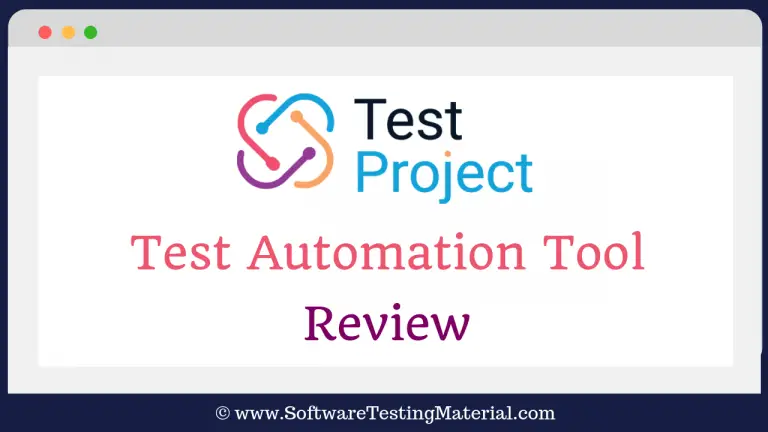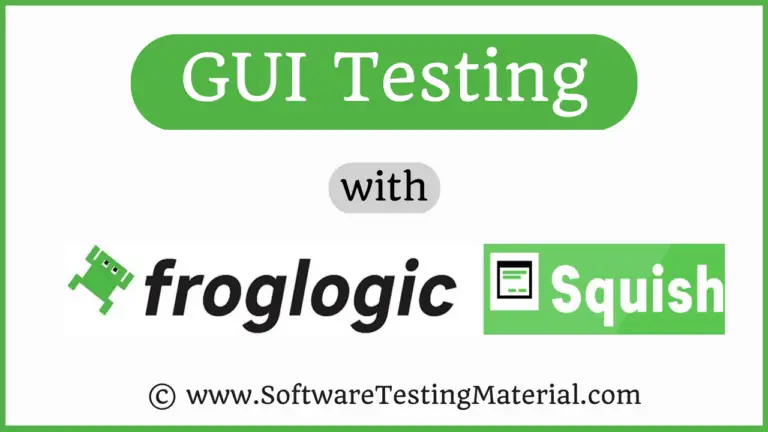TestCollab Review (2025): AI-Powered Test Management Tool for Modern QA Teams
As a Senior Software Test Engineer with over a decade of experience in quality assurance, I have used many test management tools. Some were too complex, some were missing key features of a test management tool, and some felt outdated for today’s fast-moving development world.
Recently I had the opportunity to explore TestCollab, an AI-Powered Test Management tool. Here in this TestCollab review, I will walk you through my experience and thoughts.

What is TestCollab?
TestCollab is a test management platform that designed specifically for QA and agile development teams. It helps us design, manage, and execute test cases with ease. Unlike traditional tools, it comes with AI features like QA Copilot and smart automation support. It also integrates well with modern development practices like BDD (Behavior Driven Development) and offers test datasets to make testing more realistic.
Key Features of TestCollab
1. QA Copilot – The AI Test Automation
The standout feature is definitely QA Copilot, which brings true AI test automation to web applications.
This AI-powered assistant allows testers to write test cases in plain English and automatically converts them into executable test scripts.
Usually we spent countless hours to write detailed test scripts. This no-code approach will let us save lot of time and this approach is genuinely impressive.
You can literally write “Check if login works with valid credentials” and the AI generates the corresponding automation script.
To use QA Copilot we need to first enable it by navigating to Settings – QA Copilot – Enable QA Copilot.
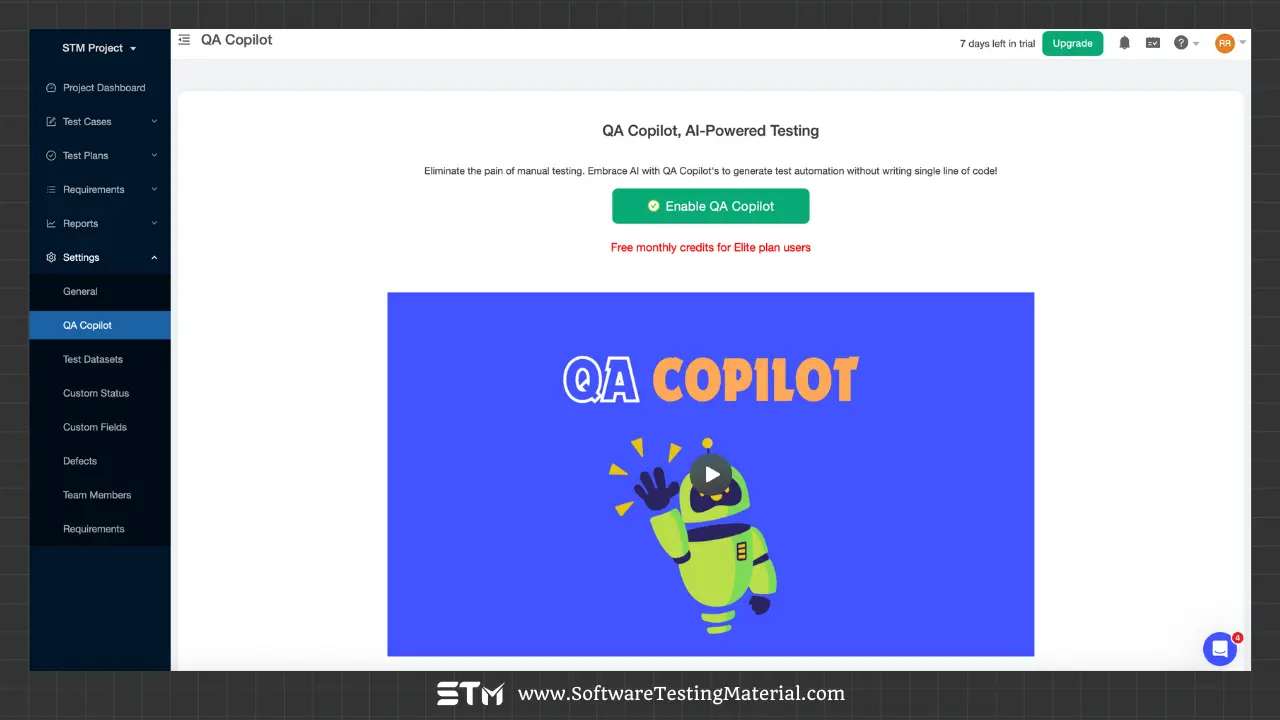
Once you enable it, we need to configure App. We need to provide the URL of our website under test.
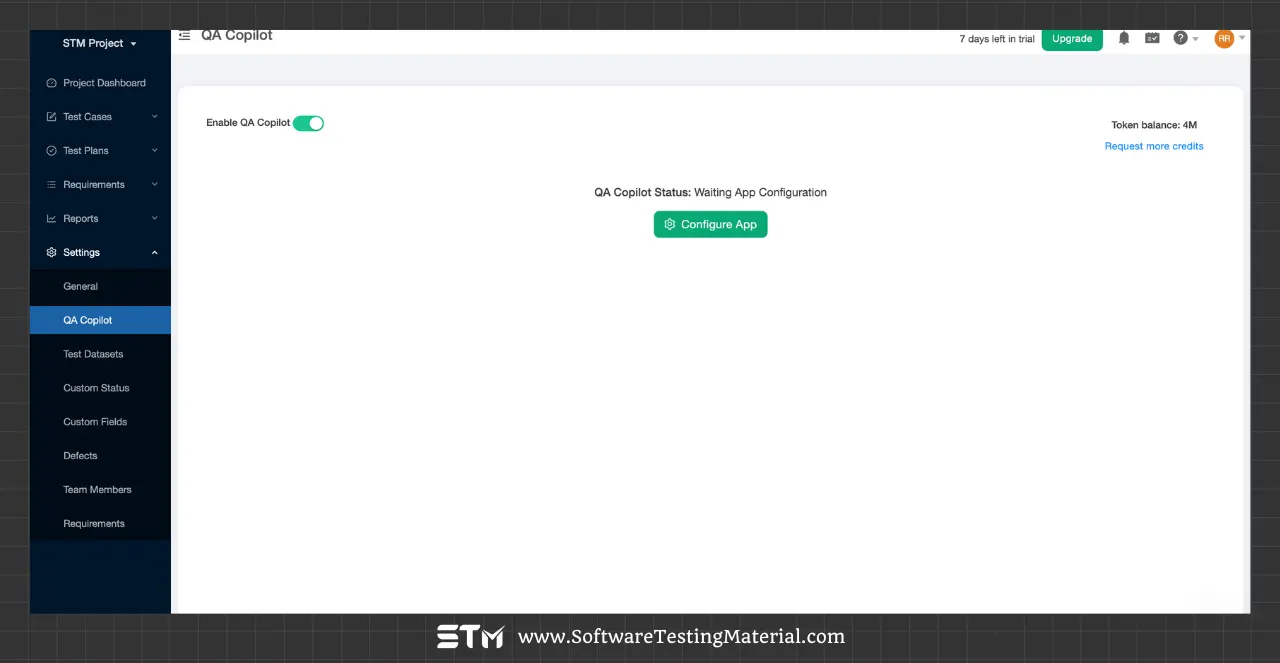
Once it is enabled, go to Test Cases – Automate with QA Copilot (on the top right corner) – Automate
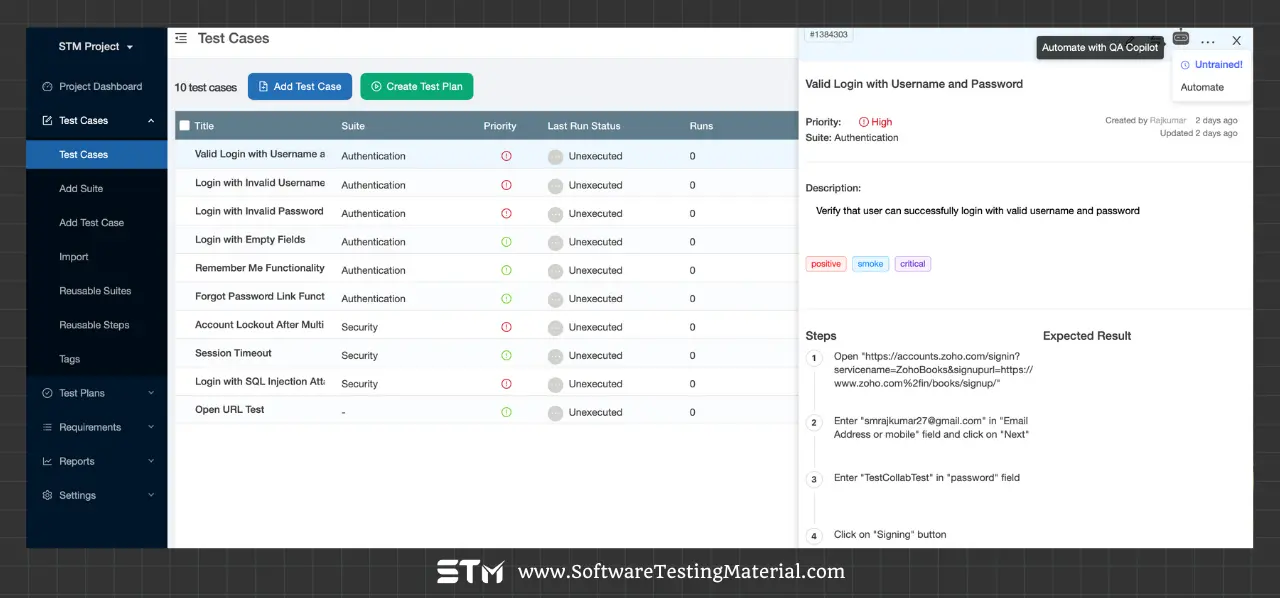
What makes QA Copilot particularly revolutionary is its ability to turn plain-english scenarios into functional tests in minutes. By the time I write this blog post it can create automated tests for only web apps. In coming days it supports mobile apps, and APIs too.
After the initial training phase, Copilot can re-execute test suites in seconds, automatically heal flaky locators, and surface edge-case defects—all with zero script maintenance and zero release delays.
Using this, we can run tests on every commit. It provides a single link with pass/fail results, screenshots, and detailed logs for easy review.
What I like in this feature?
I felt QA Copilot like an extra teammate who understands testing that too automation testing. With the help of this, I don’t have to spend hours writing test scripts. I can just focus on fine-tuning. This saves both time and effort.
- It eliminates the need for complex coding knowledge in web test automation
- It transforms test creation from hours to minutes, execution from minutes to seconds
- It auto-heals flaky locators reduces maintenance overhead dramatically (this is huge!)
- It automatically detects edge-case defects that manual reviews often miss.
- It provides a single-link reporting with screenshots and logs, making result analysis effortless.
- Every code commit triggers continuous integration, delivering immediate feedback.
- The platform is built specifically for web applications, with deep optimization for web testing
2. Smart Test Dataset Management
TestCollab’s Test Datasets feature is super useful when you’re performing data-driven testing.
Normally, when we test fast-moving projects, we end up copying the same test case again and again – just to check different usernames, environments, or configurations. That wastes a lot of time.
With this feature, you don’t need to duplicate test cases. You keep the test logic (steps) separate from the test data. This way, one test case can run with many different inputs.
Must read: Types of Test Automation Frameworks
Here’s how it works:
- In your test steps, you can use placeholders inside double braces, like {{username}}.
- At runtime, TestCollab replaces these parameters with actual data from your datasets.
- A dataset is just a simple table where each column is a parameter (like username, password, environment) and each row is one set of values.
- Each row makes the test run once with that specific data.
Another nice thing is – if you change the dataset later, TestCollab still keeps the original data for past runs. That way, you always have a clean history and audit trail.
What I like in this feature:
- Design a test once and reuse it everywhere. It eliminates copy-paste test case duplication
- It lets you update live data anytime without touching the core test logic
- It allows us to automatically create parameters by simply typing {{parameter}} in test steps
- It gives perfect audit trails with historical data preservation
- It seamlessly integrates with both manual and automated testing workflows
3. BDD (Behavior-Driven Development) Support
TestCollab’s BDD feature is not just about writing Gherkin syntax. It’s smarter than that.
Normally, with BDD, we write .feature files using Gherkin (Given-When-Then format). In TestCollab, you don’t have to manually copy those files into the tool. Instead, you can connect your Git repo directly. Using the testcollab-cli npm package, you can pull your .feature files straight into your TestCollab project.
This means your Git repository becomes the single source of truth for all BDD scenarios. And because it works with CI/CD, the syncing can happen automatically whenever .feature files are updated.
There are two ways to use TestCollab here:
BDD projects – where you sync
.featurefiles from Git.Regular projects – where you create and manage test cases directly in the TestCollab interface.
If your team uses GitHub Actions or GitLab CI, you can set them up so that every time someone changes a .feature file, TestCollab gets updated automatically.
What I like in this feature:
- Direct Git integration with .feature files keeps scenarios version-controlled
- Automatic CI/CD syncing eliminates manual updates
- Easy setup with testcollab-cli npm package
- Maintains living documentation that stays synchronized with actual tests
- Git repository as single source of truth for all test scenarios
4. Integration Capabilities
TestCollab offers extensive integration options that cover the entire development and testing ecosystem.
The platform integrates with major defect managers including Jira Cloud, GitLab, GitHub, Pivotal Tracker, Azure DevOps, and Asana.
For communication, it includes Slack integration for real-time notifications.
On the automation side, it supports Cypress, Playwright, Selenium (via API), and Katalon Studio.
Beyond pre-built integrations, TestCollab provides SDK and API options for custom integrations.
What I like in this feature:
- Comprehensive coverage of popular development tools and platforms
- Both defect tracking and automation framework integrations
- Slack notifications keep entire teams informed of testing activities
- SDK option simplifies custom integrations over raw API calls
- API flexibility for teams with unique integration requirements
5. Excellent Customer Support
TestCollab provides live chat for immediate assistance, which I found invaluable when setting up initial integrations and understanding AI prompt optimization.
Their email support delivers fast replies—not the typical “we’ll get back to you in 48-72 hours” that you see with many SaaS platforms.
For more complex issues or implementation guidance, they offer Zoom calls with their team, which is particularly valuable when you’re trying to optimize your testing workflow or troubleshoot advanced features like BDD Git integration.
What I like in this feature:
- Live chat provides instant help during setup and configuration phases
- Fast email replies ensure testing issues don’t block sprint progress
- Zoom calls with the team offer personalized guidance for complex implementations
- Multiple support channels accommodate different communication preferences and urgency levels
- Technical team genuinely understands QA challenges and provides relevant, actionable solutions
- No frustrating ticket systems or long wait times that delay project timelines
Pros and Cons
What I Like:
- User-friendly interface: Clean, intuitive design that doesn’t require extensive training
- AI test automation is revolutionary: QA Copilot’s ability to convert natural language into automated web test scripts, with auto-healing locators and zero maintenance requirements
- Powerful data-driven testing: Test Datasets & Parameters eliminate test case duplication and enable true data-driven testing workflows
- Advanced BDD with Git integration: Direct .feature file syncing from Git with CI/CD automation
- Comprehensive integrations: Extensive support for popular tools including Jira, GitHub, Slack, Cypress, and Playwright
- Outstanding customer support: Live chat, fast email replies, and Zoom calls provide multiple channels for quick issue resolution
- Flexible pricing: Multiple tiers accommodate different team sizes and needs
- Requirements traceability: Easy to link requirements to test cases and defects
- Continuous integration: Automated test execution on every commit with comprehensive reporting
- Zero maintenance automation: Auto-healing locators eliminate the biggest pain point in web test automation
Areas for Improvement:
- Limited to web applications: QA Copilot currently only supports web app testing, not mobile or API testing
- Premium features require higher tiers: Test Datasets & Parameters are only available on Elite and Enterprise plans
- Limited customization: Some organizations might find the customization options restrictive
Pricing and Value
TestCollab keeps its pricing simple and flexible, depending on the size and needs of your team.
Free Trial
- You can start with a 14-day free trial
- No credit card is required, so it’s risk-free
- This is a good way to explore the tool before committing
Premium Plan – $29 or less (per user, per month, billed yearly)
- Best for QA teams who need strong test management features.
- Covers all the basics plus the AI-powered features.
- If your team is small to mid-sized, this plan is usually enough.
Elite Plan – $39 or less (per user, per month, billed yearly)
- Designed for established teams that want an all-in-one solution.
- Includes everything in Premium plus more advanced integrations and collaboration options.
Enterprise Plan – Custom Pricing
- For large organizations that need enterprise-grade features, higher security, or custom deployment.
- Pricing is not fixed – you’ll need to talk to TestCollab’s sales team.
My Verdict
If you and your team want to use AI to make web testing easier and more efficient then TestCollab is a solid choice. Also it works best for teams that are already using modern development practices or want to start using them.
TestCollab shines when it comes to testing websites, automatically fixing broken tests, and integrating well with other development tools.
However, it’s not perfect for everyone. If your team mainly tests mobile apps or has a very small budget, you might want to look elsewhere.
In my point of view, it’s also not the best choice if you’re already heavily using other testing tools and don’t want to switch.
The standout features are really the QA Copilot and Test Datasets capabilities.
The QA Copilot lets you write tests in plain English and automatically converts them into working web tests that fix themselves when websites change. The Test Datasets feature allows you to run the same test with different data without creating duplicate tests, which saves enormous amounts of time and reduces errors.
Overall, TestCollab gets 4.5 out of 5 stars and is recommended for teams ready to modernize their web testing with AI. The combination of smart automation, easy data testing, and excellent support makes it worth trying, especially since they offer a 14-days free trial to test it out with your own projects.
Related posts:
- Testiny Test Management Tool Review
- BugBug Codeless Test Automation Tool Review
- LambdaTest AI-Powered Test Orchestration and Execution Platform Review
- QMetry Test Management Review
- BugHerd Bug Tracking Tool Review



